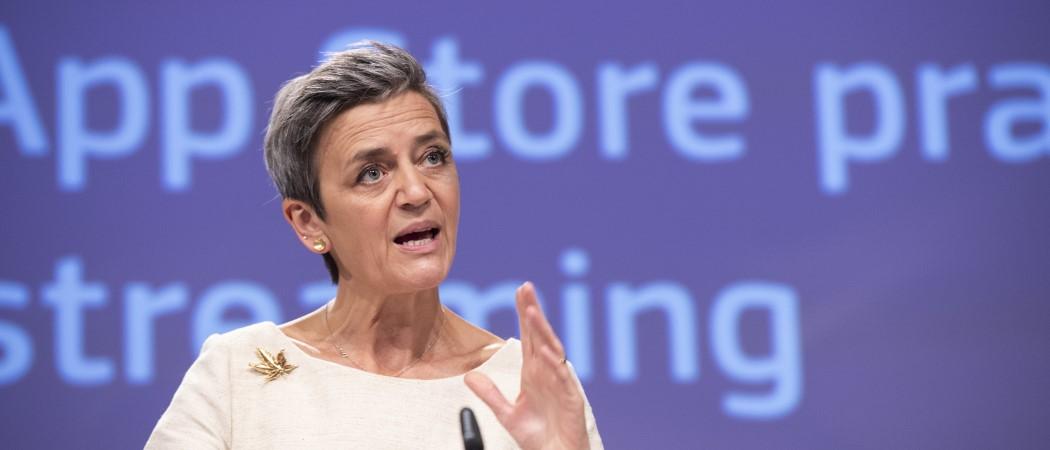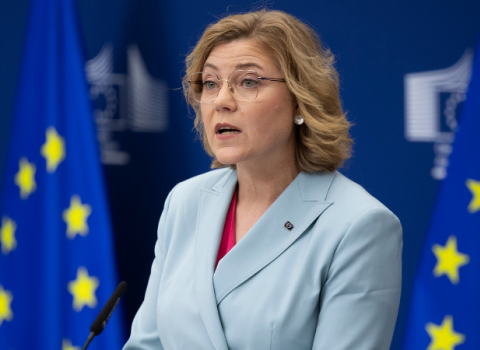Officials say Commission is divided on loaded question of excluding close EU partners UK and Israel from quantum and space research - and voice concerns at how the row is delaying rollout of Horizon Europe

Margrethe Vestager, Vice President of the European Commission. Photo: European Commission
Member state officials report feeling increasingly concerned by the delay to the start of the EU’s €95.5 billion research programme and are calling for the European Commission to quickly resolve the row over foreign access to EU research projects.
There is frustration over what officials see as the failure of the Commission to articulate a single approach on how to open Horizon Europe to researchers outside the bloc.
The EU executive is proposing to limit access to projects that touch on “sensitive union assets”, such as the Galileo and Copernicus satellites, while restricting access to some of its major quantum and space projects, according to the latest proposal dated May 19. The issue has raised alarm in close EU partners, including Israel, the UK and Switzerland.
Yet member state representatives say that a meeting to discuss exclusions on Wednesday heard contrasting messages from civil servants in three Commission directorates, DG Research, DG Connect and DG Defence Industry and Space. The Commission was contacted for comment.
EU commissioners are reported to have different views over how far to push the strategic autonomy agenda for Horizon Europe, with the internal market commissioner Thierry Breton suspected of being on the side of more limits, and a camp led by competition and digital chief Margrethe Vestager arguing for more openness.
Following the Wednesday meeting, which produced no clear resolution, EU diplomats also complained about how difficult it is to impose restrictions on non-EU countries before any association agreements have been drawn up. Commission officials have held exploratory talks for association deals with a few non-EU countries, but detailed membership terms have yet to emerge.
Key Commission officials argue that exclusions for select projects are necessary so the EU can protect its research base in rapidly developing fields.
But EU member states are generally concerned that these curbs will damage relationships with the longstanding partners. A group of states, led by Germany, have written to the Commission, arguing that its proposal to exclude close EU partners from projects “would result in mistrust among the scientific community and minimise the added value of Horizon Europe for the EU significantly”.
Following Wednesday’s meeting, an EU diplomat said it was unacceptable to hold up the launch of Horizon Europe any longer over the fractious issue. The research scheme ‘soft launched’ in February but no project calls have yet been made.
Others argue that the Commission risks harming the very research fields – like quantum – it is desperate to see its researchers develop prowess in.
The League of European Research Universities secretary-general, Kurt Deketelaere, gave voice to this feeling last week when he tweeted that the proposal to exclude partners like Israel and the UK from quantum would “kill your own R&I programme, before it even started.”
Further talks on the issue of exclusions are expected in the coming weeks.
EU limits
The evolving EU position on research openness follows concern in Europe over intellectual property theft and the authoritarian use of technologies by China and other countries.
In a broad policy document published last week, which sets out the EU vision on global science collaboration, the bloc said it would pursue “nuanced and modulated” rules of engagement with foreign countries in the future based on “levels of reciprocity, a level playing field, and the respect for fundamental rights and shared values,” while protecting EU-funded research from those seeking to abuse the system.
Critics warn against a creeping EU protectionism that could damage cooperation with trusted partners. German MEP Niklas Nienass, spokesman on space for the European Parliament’s Greens group, told Science|Business in March that the proposed curbs go too far. “To exclude these countries right across quantum and space projects would be insane,” he said. Quantum scientists across Europe have also come out strongly against the proposed curbs for non-EU scientists.
The Commission has already been met with a backlash from member states to its proposal. In a revised plan presented to member states on May 19, the Commission put forward a smaller list of restricted areas than initially proposed several months ago. The Commission now wants to limit participation of non-EU entities in 49 actions in the main 2021/22 Horizon work programme, which sets out funding priorities and competitions for the first year of the bloc’s new seven-year science scheme.
This figure has been reduced from an initial longer list of 77 actions and represents 4.2% of the actions in this work programme and less than 3.1% of the total 21/22 budget of Horizon Europe, the note explains.





 A unique international forum for public research organisations and companies to connect their external engagement with strategic interests around their R&D system.
A unique international forum for public research organisations and companies to connect their external engagement with strategic interests around their R&D system.